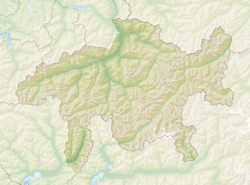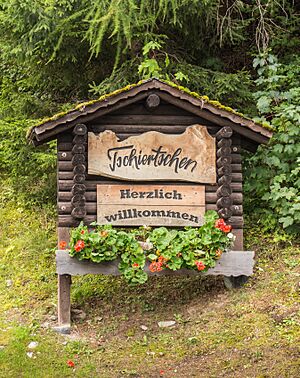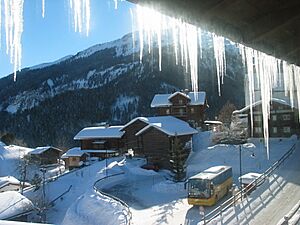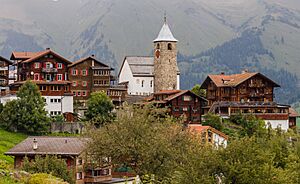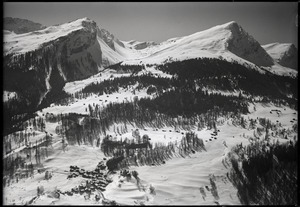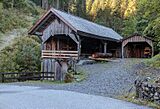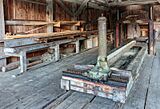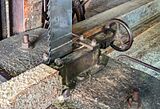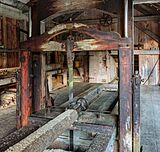Tschiertschen facts for kids
Quick facts for kids
Tschiertschen
|
||
|---|---|---|
|
||
| Country | Switzerland | |
| Canton | Graubünden | |
| District | Plessur | |
| Area | ||
| • Total | 21.39 km2 (8.26 sq mi) | |
| Elevation | 1,350 m (4,430 ft) | |
| Population | ||
| • Total | 208 | |
| • Density | 9.724/km2 (25.19/sq mi) | |
| Postal code |
7064
|
|
Tschiertschen is a small village located in the canton of Graubünden, Switzerland. It is part of the municipality of Tschiertschen-Praden in the Plessur district.
Tschiertschen used to be its own independent municipality. However, on January 1, 2009, it joined with the nearby village of Praden to form the new municipality of Tschiertschen-Praden.
Contents
History of Tschiertschen
Tschiertschen is a very old place! It was first mentioned in historical records around the end of the 8th Century. Back then, its name was written as in Cercene.
Exploring Tschiertschen's Geography
Tschiertschen covers an area of about 21.4 square kilometers (8.3 square miles). A large part of this land, about 52.6%, is used for farming. Forests cover about 22.6% of the area.
Only a small part, 1.4%, has buildings or roads. The rest, about 23.4%, is made up of natural features like rivers, glaciers, or mountains.
The village is found on the mountain slopes. It sits above the left side of the Schanfigger valley. Tschiertschen is a "haufendorf" village. This means it grew in an unplanned way, with buildings close together around a central area. The village is located at an elevation of about 1,351 meters (4,432 feet) above sea level.
People and Population in Tschiertschen
In 2008, Tschiertschen had a population of 208 people. About 13.5% of these residents were from other countries. Over the ten years before 2008, the number of people living in Tschiertschen decreased by about 12.8%.
Most people in Tschiertschen speak German. In 2000, about 96% of the population spoke German. Serbo-Croatian was the second most common language, spoken by 1.3% of people. Italian was third, spoken by 0.9%.
In 2000, the population was almost evenly split between males and females. About 48.1% were male and 51.9% were female.
Education and Jobs
Most people in Switzerland are well-educated. In Tschiertschen, about 76.3% of adults (aged 25-64) have finished high school or gone on to higher education. This includes university or a specialized college.
Tschiertschen has a low unemployment rate of 1.79%. In 2005, 15 people worked in the primary economic sector. This means they worked in jobs like farming or forestry. There were 6 businesses in this sector.
The secondary sector had 14 people working in 4 businesses. This sector includes jobs like manufacturing or construction. The tertiary sector had 47 people working in 19 businesses. This sector includes services like tourism, shops, and hotels.
Historical Population Numbers
Here is a table showing how the population of Tschiertschen has changed over time:
| year | population |
|---|---|
| 1803 | 130 |
| 1850 | 124 |
| 1870 | 160 |
| 1900 | 139 |
| 1950 | 174 |
| 2000 | 225 |
Wood Sawmill Sagi Tschiertschen
The Sawmill Sagi Tschiertschen is a special place. It gets its power from the water of the Sagabachs stream! The sawmill was first built in 1920. It was later updated in 1989. You can often see demonstrations of how the sawmill works from May to September.
Photo gallery sawmill Sagi Tschiertschen
Weather in Tschiertschen
Tschiertschen experiences about 123.9 days of rain each year. On average, it receives about 1095 millimeters (43 inches) of rain or snow.
The wettest month is August. During this month, Tschiertschen gets about 140 millimeters (5.5 inches) of rain. It rains for about 12.7 days in August. June has the most days with rain, averaging 13.1 days, but with less total rain (128 millimeters or 5 inches). The driest month is February, with only about 61 millimeters (2.4 inches) of rain over 12.7 days.
See also
 In Spanish: Tschiertschen para niños
In Spanish: Tschiertschen para niños
 | Emma Amos |
 | Edward Mitchell Bannister |
 | Larry D. Alexander |
 | Ernie Barnes |




